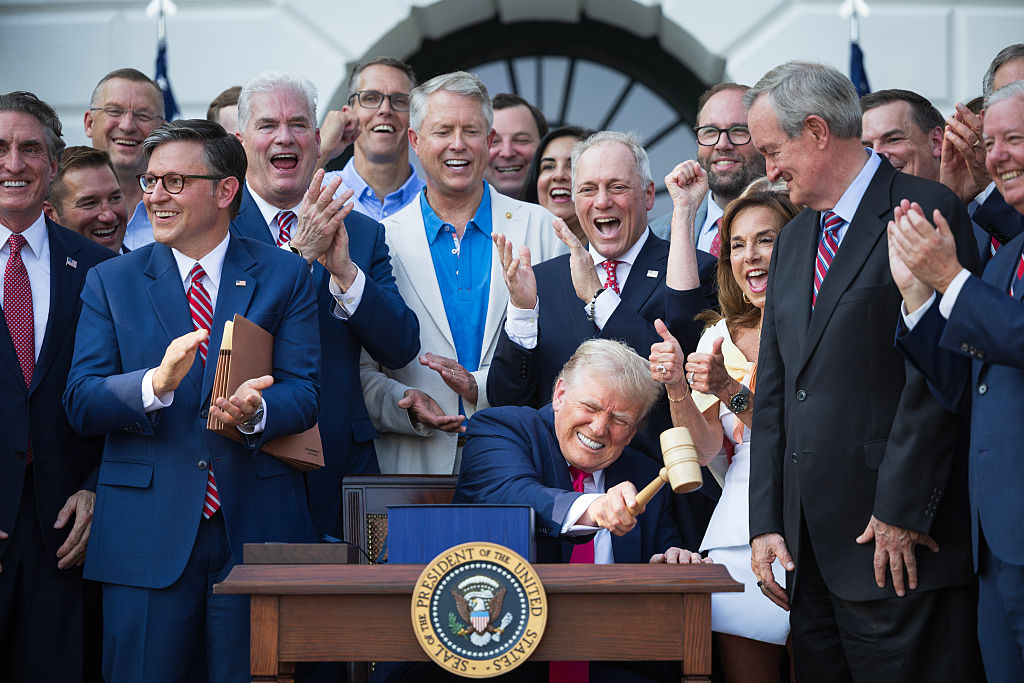Transcript: J.D. Vance on "Face the Nation," Dec. 31, 2017
President Trump is entering 2018 with his first major legislative victory under his belt, having signed into law his party's massive tax reform bill just before Christmas. But some are warning that Mr. Trump faces steep political consequences if his core voters don't reap the benefits of a growing economy.
J.D. Vance, the author the heralded 2016 memoir "Hillbilly Elegy," says many Americans in the middle of the country will become "politically frustrated" and have their "hopes dashed" if Mr. Trump doesn't deliver on his promises to increase wages and spur economic growth.
"One of the things I really worry about is that if you don't see middle class wage growth, if you don't see the economy in certain areas of the country, the middle part of the country, starting to come back in the same way that it's doing especially well, let's say, in California or New York, then people are going to become politically frustrated," Vance told CBS News chief White House correspondent Major Garrett.
The following is a transcript of the interview with Vance airing Sunday, Dec. 31, 2017, on "Face the Nation."
MAJOR GARRETT: We sat down recently with J.D. Vance, author of "Hillbilly Elegy." Vance's book has been credited with identifying the so-called "forgotten Americans" who helped carry Donald Trump to his unexpected victory. A year in to the Trump administration, Vance warns those voters might well be disappointed if the president's rhetoric doesn't match reality.
JD VANCE: I started writing the book back in 2013. And, of course, no one at that time, certainly not me, knew what we were going to see with the nomination and then, of course, the election of Donald Trump. I definitely thought that when the book was coming out, and this was June of 2016, hard to believe it's been that long, I thought that a lot of folks would be trying to ask questions about who the Trump voter was.
And, of course, that's a little bit about what my book is about. I don't mention Donald Trump, but I certainly talk a lot about people-- people living in a certain part of the country, people from a certain demographic segment who did overwhelmingly support the president, both in the nominating contest but also, of course, in the general election.
MAJOR GARRETT: For that community that you write about in the book and that you grew up in, what do you think those larger truths are that they heard that he spoke to in ways they hadn't heard before?
JD VANCE: Well, I think one-- one the most important larger truths that he spoke to is the importance of jobs in the life of the community. If you think about Republican rhetoric, let's say, during the campaign of Mitt Romney, very focused on the noble entrepreneur. Very focused on the job creator, but not so much on the worker.
And if you think of- of the rhetoric of- of modern Democrats, it's often so focused on government that people don't accept-- I think a lot of those-- a lot of folks on the left don't appreciate that-- that people don't want a handout. They don't want government support and they don't, from the right, want people to talk about the noble entrepreneur.
What they want is-- is people to recognize the dignity of working people. And I think that what was genius about the politics of Trump's campaign is that he focused on workers and he focused on jobs. It wasn't about the wealthy entrepreneur with a private jet. It wasn't about a government handout. It was about the folks in the middle.
MAJOR GARRETT: In the conversation about the tax bill, as an example --
JD VANCE: Sure.
MAJOR GARRETT: -- he doesn't talk about supply side economics, he doesn't talk about any theory at all --
JD VANCE: You know, I think it's very effective. When the president talks about tax reform, he talks about the people who will benefit. He talks about American jobs.
He talks about the fact that we're going to be taking money that's overseas and bringing it back to the United States so that it will employ American workers. I think that focus again on the American working and middle class is- is-is to me the most thoughtful and, in some ways, the most genius part of Trump's approach to politics.
MAJOR GARRETT: And I will tell you, having attended more than 75 Trump rallies, there were times when I would laugh to myself when he would say, "Every dream you've ever dreamed is going to come true. And America's going to get back winning again." I thought, "Oh, come on, this-- even by political standards, this is sort of cotton candy--
JD VANCE: Sure.
MAJOR GARRETT: -- taken to the maximum level." And yet, having read your book, it occurs to me the concept of putting winning or victory central to it, to people who maybe feel like they've either become losers or forgotten, that was much more powerful than I thought --
JD VANCE: Mm-hm.
MAJOR GARRETT: -- or imagined at the time. Do you think that's possible?
JD VANCE: Yeah. Well, I think that- that sense of loss is really important. The idea that 30 or 40 years ago, things were really going well and now they've started to disintegrate. Not just our work life, but our family life and a lot of other issues on top of that.
MAJOR GARRETT: Do you think there is a danger for Trump going forward, the president going forward, and these voters, that his rhetoric and their expectations may never match?
JD VANCE: I think that that's certainly a concern. It's a political concern for the Trump administration. But it's a concern for Americans.
MAJOR GARRETT: It's a ground level concern.
JD VANCE: Absolutely. It's-- it's a concern for a lot of folks who really do expect things to get a whole lot better. One of the things I really worry about is that if you don't see middle class wage growth, if you don't see the economy in certain areas of the country, the middle part of the country, starting to come back in the same way that it's doing especially well, let's say, in California or New York, then people are going to become politically frustrated.
But more importantly, they're going to have a lot of hopes dashed. This sense that maybe this is the moment, this is the electoral moment where a lot of our fortunes turn around, that-- that's going to disappear. And consequently, folks are going to be pretty upset about it.
MAJOR GARRETT: And part of your next phase of life is to deal with this.
JD VANCE: Yeah. Yeah. Definitely. One-- one of the things that I'm working on with Steve Case is this Rise of the Rest initiative that I'm-- I'm pretty passionate about. If you look at where the net job growth comes, it comes from high growth startup companies.
And unfortunately, you don't see a lot of high growth startup companies outside of California and New York and Boston, Massachusetts. And so what we're trying to do is in some ways democratize access to capital, invest in areas that don't get as much-- as much entrepreneurial investing, and hopefully, start to create some of those new twenty-first century jobs in places that don't see that job creation.
MAJOR GARRETT: And in my travels, I've seen a little bit of that in Des Moines, Iowa.
JD VANCE: Sure.
MAJOR GARRETT: I've seen a little bit of that in Omaha, Nebraska.
JD VANCE: Yep.
MAJOR GARRETT: It's not as if it doesn't exist in --
JD VANCE: Exactly.
MAJOR GARRETT: -- "flyover country," but you want to accelerate?
JD VANCE: Yeah, exactly. It certainly exists. It's-it's -- there-- there are certainly really exciting pockets of entrepreneurship all across the country--
MAJOR GARRETT: Usually linked to a university of some kind.
JD VANCE: Exactly. You know, universities provide high quality talent. They provide intellectual property necessary for folks to get their businesses off the ground. But you still don't see nearly as much investment in these areas even though you see pockets of hope, right?
So the statistic I throw out is 50% of venture capital goes to California. Most of the rest of it goes to New York and Massachusetts. That means there's 47 states (sic) fighting over a very small amount of the type of investment that creates really high quality, long term, durable jobs.
And so if you can rearrange that, if you can create more entrepreneurship and more investment in some of these areas, are you going to fix all the problems I wrote about in Hillbilly Elegy? No. But you will start to create some more high quality job growth.
MAJOR GARRETT: And then this brings us back to some of the embedded behavioral problems you write about in Hillbilly Elegy and those are going to have to change even if this capital arrives.
JD VANCE: Yes. That's-- that's absolutely right.
MAJOR GARRETT: You speak quite candidly --
JD VANCE: Sure.
MAJOR GARRETT: -- about laziness and people who think they work, but don't actually work. And that they're part of this equation. And that reckoning is going to have to occur, number one, and won't be easy to.
JD VANCE: Yeah, absolutely. I mean, look. You-- you go to a town like Middletown, Ohio where some people are struggling to find a job, but then there are people who had a good job and lost it not because the economy was bad, but because they made mistakes. You see both types of people. And I think we have to recognize that there are these twin impulses that exist.
There is a need for more economic growth, for more job growth. But there is a need in some people for them to recognize that they have a role in making these problems better. And we can't-- we can't ignore that.
The issue that's really, really concerning is that you have eight million prime age men who have dropped out of the labor force, folks who aren't even looking for work. You can create job growth all day, but unless you start to do the things that bring those labor force dropouts back into the job market, you're not going to solve the problems I wrote about in the book.
MAJOR GARRETT: JD, thanks so much for your time.
JD VANCE: Thanks, Major.
MAJOR GARRETT: And we'll be right back.



